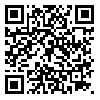Sat, Dec 13, 2025
| فارسی
Volume 30, Issue 1 (Continuously Updated 2024)
IJPCP 2024, 30(1): 0-0 |
Back to browse issues page
Download citation:
BibTeX | RIS | EndNote | Medlars | ProCite | Reference Manager | RefWorks
Send citation to:



BibTeX | RIS | EndNote | Medlars | ProCite | Reference Manager | RefWorks
Send citation to:
Akbarizadeh F, Soleimani A, kachooei M, Farahani H. Relationship Between Mothers’ Adverse Childhood Experiences and Children’s Psychological Problems, Mediated by Mothers’ Emotional Dysregulation and Mental Capacity. IJPCP 2024; 30 (1) : 4825.1
URL: http://ijpcp.iums.ac.ir/article-1-4062-en.html
URL: http://ijpcp.iums.ac.ir/article-1-4062-en.html
1- Department of Clinical Psychology, Faculty of Humanities, University of Science and Culture, Tehran, Iran.
2- Department of Psychology, Faculty of Humanities, University of Science and Culture, Tehran, Iran. ,ali.soleymani@usc.ac.ir
3- Department of Psychology, Faculty of Humanities, University of Science and Culture, Tehran, Iran.
4- Department of Psychology, Faculty of Humanities, Tarbiat Modares University, Tehran, Iran.
2- Department of Psychology, Faculty of Humanities, University of Science and Culture, Tehran, Iran. ,
3- Department of Psychology, Faculty of Humanities, University of Science and Culture, Tehran, Iran.
4- Department of Psychology, Faculty of Humanities, Tarbiat Modares University, Tehran, Iran.
Abstract: (2876 Views)
Objectives Psychological problems in children are a significant public health concern. These problems can affect the well-being of children, their families, and peers and negatively impact the quality of their lives in adulthood. The present research aims to assess the relationship between mothers’ adverse childhood experiences (ACEs) and the internalizing and externalizing problems of children mediated by mothers’ emotional dysregulation and mental capacity.
Methods This is a correlational study using structural equation modeling. The study population consists of all married women with children aged 6-12 in Bushehr Province, Iran, who had registered information in the electronic comprehensive health services system in 2022. Utilizing a random cluster sampling method, 700 women were selected, of whom 632 completed the online questionnaires, including the child behavior checklist, the ACE questionnaire, the difficulties in emotion regulation scale, and the parental reflective functioning questionnaire. All analyses were performed in SPSS Software, version 26 and AMOS version 24 software.
Results The ACE of mothers had a direct and significant relationship with their emotion regulation difficulties (β=0.363, P<0.001) and internalizing (β=0.182, P<0.001) and externalizing problems (β=0.201, P<0.001) of children. Additionally, the ACE in mothers had an indirect and significant relationship with their mental capacity (β=-0.125, P=0.006). The ACE of mothers also had an indirect and significant relationship with internalizing (β=0.126, P<0.001) and externalizing (β=0.134, P<0.001) problems of children through emotion dysregulation. The ACE of mothers also had an indirect and significant relationship with externalizing problems of children (β=0.011, P=0.039) through mental capacity.
Conclusion Mothers’ ACEs have a direct impact on their children’s internalizing and externalizing problems. This relationship can also be mediated by their emotional dysregulation and mental capacity.
Methods This is a correlational study using structural equation modeling. The study population consists of all married women with children aged 6-12 in Bushehr Province, Iran, who had registered information in the electronic comprehensive health services system in 2022. Utilizing a random cluster sampling method, 700 women were selected, of whom 632 completed the online questionnaires, including the child behavior checklist, the ACE questionnaire, the difficulties in emotion regulation scale, and the parental reflective functioning questionnaire. All analyses were performed in SPSS Software, version 26 and AMOS version 24 software.
Results The ACE of mothers had a direct and significant relationship with their emotion regulation difficulties (β=0.363, P<0.001) and internalizing (β=0.182, P<0.001) and externalizing problems (β=0.201, P<0.001) of children. Additionally, the ACE in mothers had an indirect and significant relationship with their mental capacity (β=-0.125, P=0.006). The ACE of mothers also had an indirect and significant relationship with internalizing (β=0.126, P<0.001) and externalizing (β=0.134, P<0.001) problems of children through emotion dysregulation. The ACE of mothers also had an indirect and significant relationship with externalizing problems of children (β=0.011, P=0.039) through mental capacity.
Conclusion Mothers’ ACEs have a direct impact on their children’s internalizing and externalizing problems. This relationship can also be mediated by their emotional dysregulation and mental capacity.
Article number: 4825.1
Keywords: Adverse Childhood Experience, Emotional Dysregulation, Mentalization, Externalizing problems, Internalizing problems
Type of Study: Original Research |
Subject:
Psychiatry and Psychology
Received: 2023/11/21 | Accepted: 2024/05/19 | Published: 2024/08/19
Received: 2023/11/21 | Accepted: 2024/05/19 | Published: 2024/08/19
| Rights and permissions | |
 |
This work is licensed under a Creative Commons Attribution-NonCommercial 4.0 International License. |






